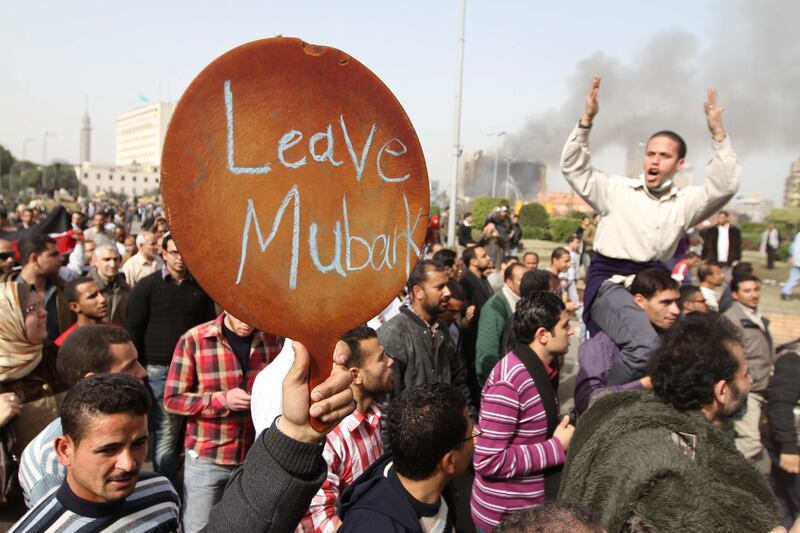Thousands of Egyptians took their revolt to the streets for a fifth day today, as anti-regime riots erupted anew in several cities including Cairo and an enraged mob killed three police in the Sinai town of Rafah, bringing the overall death toll from the nationwide protests since Tuesday to at least 48.
Angry citizens streamed into Cairo's Tahrir square, a focal point for the street battles that have raged around Egypt since Tuesday and in which at least 35 people have died, chanting: "Mubarak out!" as troops looked on.
"We came here to say we don't want you [Mubarak] at all, we want you out of the country," Mohammed Osama, 25, a lawyer, told AFP as the army announced that a night-time curfew would be enforced and extended in key cities.
Police who have been battling protesters with tear gas, water cannon and rubber-coated bullets were largely absent, while tanks were deployed on the square and at strategic sites around the capital.
The Egyptian government resigned, a measure Mr Mubarak promised during an overnight televised address, and the president was due to appoint a new cabinet although most protesters want nothing less than Mubarak's departure.
A curfew in Cairo, Alexandria and Suez that was largely ignored on Friday night was extended from 4pm to 8am, state television said, with the army warning people not to gather in public places.
The armed forces urged "the great people of Egypt … to refrain from congregating in main roads or public squares, and to obey a curfew," according to a statement carried by the official MENA news agency. "Legal measures will be taken against those in violation," it said.
Shops and offices were looted overnight despite the curfew, with many protesters clambering onto army tanks and urging soldiers to join them.
Police detained around 14 people on one Cairo bridge, saying they were looters and forcing them to kneel, hands behind their heads.
One officer told AFP, with 60 per cent of Egypt's police stations reportedly torched: "We've been left without anything because of the people, but still we have to catch the thieves. Those people want change, but did they think that if they destroyed a police station and used violence the thieves would not come into their midst?"
Clashes also erupted in the key port city of Ismailiya, east of Cairo, where thousands of workers fought running battles with police.
Mr Mubarak, 82, addressed the nation overnight, sacking the government and vowing economic and political reforms in the world's most populous Arab nation but showing no sign of easing his decades-old grip on power.
Protesters who have been demanding that Mr Mubarak step down, as well as an end to endemic state corruption and police brutality that have become systematic under his rule, dismissed his speech as too little, too late.
In Alexandria, hundreds of people camped out by the main mosque in the centre of the Mediterranean city vowing to protest again, with several police stations still burning amid sporadic looting.
As in Cairo, tanks were deployed and the police were absent. Civilians directed traffic and conducted clean-up efforts.
In Tahrir square, hundreds chanted: "Those who love Egypt, don't destroy it."
Despite the ongoing protests, two Cairo mobile phone networks came back on line today, a day after all Egyptian operators were told to cut services.
But internet access appeared still to be cut, with the inability to use microblogging sites such as Twitter or social networking sites such as Facebook affecting activists' coordination of their activities.
The US president, Barack Obama, called on the Egyptian authorities not to use violence against the political protests, driving home his message in a 30-minute phone call with Mr Mubarak.
The Egyptian health ministry said that 38 people died around the country during Friday's protests, many fatalities caused by rubber-coated bullets. Seven more died on Wednesday and Thursday.
Mr Obama urged Mr Mubarak to take "concrete" steps towards political reforms, saying he must turn "a moment of volatility" into "a moment of promise."
Washington has toughened its line on a key Middle Eastern ally, warning Egypt it would review billions of dollars in aid based on the behaviour of its security forces.
Egypt is one of the world's largest recipients of US aid, receiving $1.3 billion annually in military assistance alone.
Demonstrators also torched the Cairo headquarters of Mr Mubarak's ruling National Democratic Party, which was still burning today as civilians cleared the burned-out carcasses of police vehicles from the road.
The demonstrations, inspired by events in Tunisia, are the largest in Egypt in the three decades of Mr Mubarak's rule, sending shock waves across the region.
At least 1,500 civilians and 1,000 police have been injured in protests since Tuesday.
A security source said that 60 per cent of police stations around the country had been torched, at least 17 in the capital.
More than 350 people were arrested on Friday, including 50 leaders of the banned Muslim Brotherhood.





